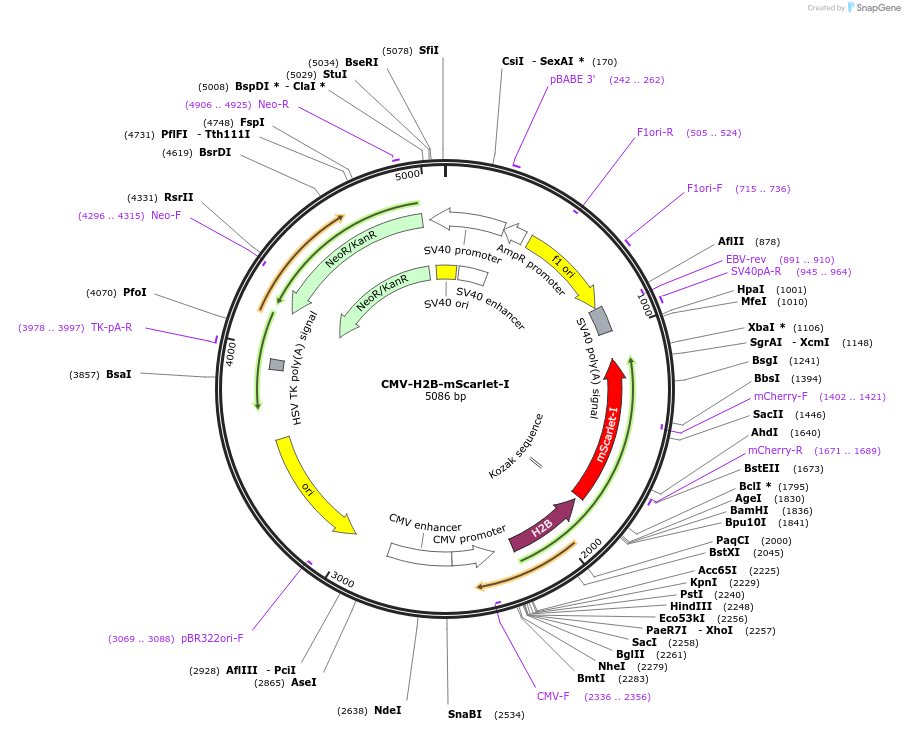CMV-H2B-mScarlet-I
(Plasmid
#182297)
-
PurposeLocalization of mScarlet-I fluorescent protein to histone 2B
-
Depositing Labs
-
Sequence Information
Ordering
| Item | Catalog # | Description | Quantity | Price (USD) | |
|---|---|---|---|---|---|
| Plasmid | 182297 | Standard format: Plasmid sent in bacteria as agar stab | 1 | $85 | |
Backbone
-
Vector backboneH2B-GFP
-
Backbone manufacturerGeoff Wahl Lab (Addgene #11680)
- Backbone size w/o insert (bp) 4390
- Total vector size (bp) 5086
-
Modifications to backboneeGFP sequence was removed and replaced by mScarlet-I
-
Vector typeMammalian Expression
-
Selectable markersNeomycin (select with G418)
Growth in Bacteria
-
Bacterial Resistance(s)Kanamycin, 50 μg/mL
-
Growth Temperature37°C
-
Growth Strain(s)DH5alpha
-
Copy numberHigh Copy
Gene/Insert
-
Gene/Insert namemScarlet-I
-
SpeciesSynthetic
-
Insert Size (bp)696
-
Tag
/ Fusion Protein
- mScarlet-I (C terminal on insert)
Cloning Information
- Cloning method Restriction Enzyme
- 5′ cloning site BamHI (unknown if destroyed)
- 3′ cloning site MfeI (unknown if destroyed)
- 5′ sequencing primer TGAACCGTCAGATCCGCTAG
- 3′ sequencing primer GGCTGATTATGATCTAGAGTCGC (Common Sequencing Primers)
Resource Information
-
Addgene Notes
Terms and Licenses
-
Academic/Nonprofit Terms
-
Industry Terms
- Not Available to Industry
Trademarks:
- Zeocin® is an InvivoGen trademark.
Depositor Comments
A portion of this plasmid was derived from a plasmid made by Gadella Lab (Addgene #85086)
These plasmids were created by your colleagues. Please acknowledge the Principal Investigator, cite the article in which the plasmids were described, and include Addgene in the Materials and Methods of your future publications.
-
For your Materials & Methods section:
CMV-H2B-mScarlet-I was a gift from Severine Degrelle & Thierry Fournier (Addgene plasmid # 182297 ; http://n2t.net/addgene:182297 ; RRID:Addgene_182297) -
For your References section:
Novel fluorescent and secreted transcriptional reporters for quantifying activity of the xenobiotic sensor aryl hydrocarbon receptor (AHR). Degrelle SA, Ferecatu I, Fournier T. Environ Int. 2022 Sep 24;169:107545. doi: 10.1016/j.envint.2022.107545. 10.1016/j.envint.2022.107545 PubMed 36179647





